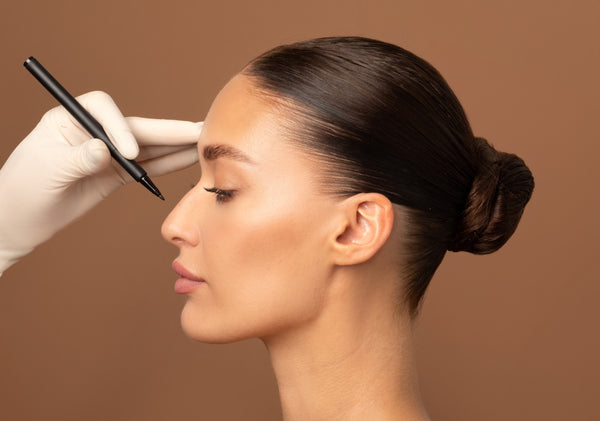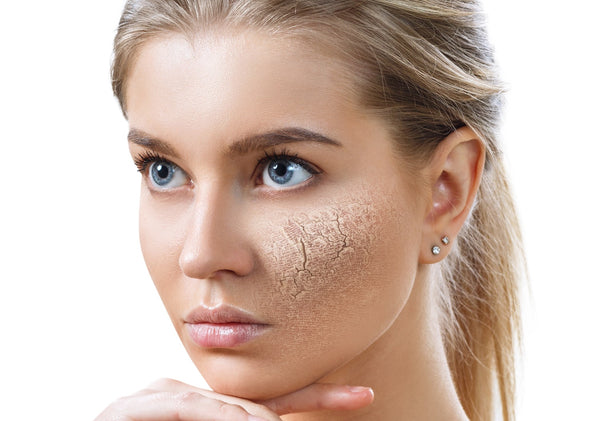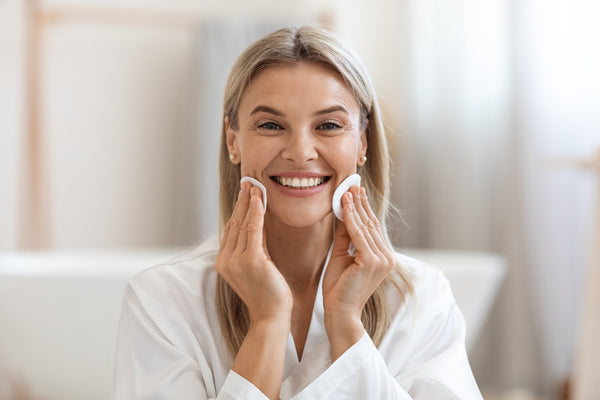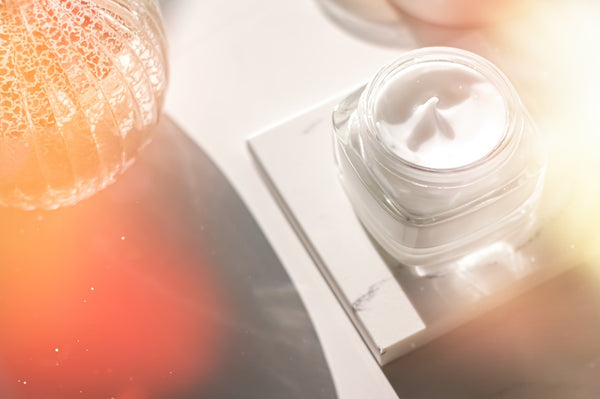Retinol vs. Hyaluronic Acid: Understanding the Differences

Differences Between Retinol and Hyaluronic Acid
Unsure how to choose the best skincare solutions for your unique needs? Wondering which beauty industry buzzwords produce the desired results? Look no further - retinol and hyaluronic acid are powerful ingredients that can make all the difference in achieving a beautiful, youthful complexion. Their high-performance properties work together as an optimal anti-aging skincare solution. Retinol helps promote cell production, reduce signs of aging and improve texture while hyaluronic acid provides deep hydration - making it a perfect addition to your routine!
With these two ingredients combined, you'll be one step closer to getting the glowing complexion you've always wanted.
Retinol: Benefits for Your Skincare Routine
From its anti-aging properties, to its ability to improve skin texture and tone, to encouraging collagen production - retinol is a powerhouse ingredient that can revolutionize your skincare routine! Thanks to its miraculous qualities, this form of Vitamin A can help reduce fine lines and wrinkles, diminish age spots and large pores and treat acne - making it an absolute must for achieving a youthful complexion. Plus, you don't even need a prescription - easily incorporate retinol into your daily skincare regimen and you’ll be seeing results in no time! With the power of retinol at your fingertips, looking your best has never been easier.
Rejuvenate and revitalize your complexion with ease! Retinol, a form of Vitamin A, is available in select skincare products without the need for a prescription. As it is applied to the skin, it's converted into retinoic acid, an active ingredient that promotes youthful and healthy-looking skin. With this simple yet effective skincare solution, you can get the vibrant glow you’ve been yearning for in no time!
 There are many benefits of using retinol in your skincare routine:
There are many benefits of using retinol in your skincare routine:
- Cell Turnover: Retinol boosts cell turnover by promoting the faster development of healthy, new skin cells. This ingredient works with the natural regenerating processes in the body, so the old cells are shed.
- Collagen Production: Retinol also promotes collagen production while increasing cell turnover. This essential element is beneficial for preventing wrinkles and fine lines.
- Reducing Skin Pigmentation: Another benefit of increased cell turnover is that this skincare product can help to prevent melanin production, which reduces hyperpigmentation.
- Elastin Production: Additionally, retinol promotes elastin production, which is another essential factor for maintaining a youthful appearance because it helps to maintain tight, firm skin.
- Skin Tightening: Many people find that regular retinol use helps to tighten the skin to minimize the appearance of wrinkles, fine lines, and pores.
- Oil Regulation: This ingredient is beneficial to regulate the production of oil. In fact, people with acne problems often benefit from retinol because it balances oil in the skin and minimizes breakouts.
-
Prevents and Treats Acne Scarring: Using retinol is an effective way to prevent acne scarring by reducing the risk of a breakout. Additionally, the exfoliating benefits can support skin healing and minimize the appearance of acne scarring.
You probably won’t notice major benefits from using retinol for a few days or weeks. For the best results, it’s necessary to use retinol for about six months before you start seeing noticeable results. Consistency is key! The best results are typically visible after about a year of usage.
Potential Side Effects of Retinol
 As you are comparing retinol and hyaluronic acid, it’s also important to consider potential negative side effects from these products. Unfortunately, retinol is often known for causing skin irritation, especially when used incorrectly.
As you are comparing retinol and hyaluronic acid, it’s also important to consider potential negative side effects from these products. Unfortunately, retinol is often known for causing skin irritation, especially when used incorrectly.
If the dosage is too strong or you are using the product in the wrong way, it can cause certain skin conditions to worsen. When these negative results occur, it can take quite a bit of time to correct.
Most people can use retinol and experience great results, but there are potential side effects. These side effects vary depending on your skin type, the percentage of retinol you use, and how often you use the skincare product.
Negative side effects of retinol might include:
- Skin irritation
- Peeling skin
- Redness
- Dryness
If your skin is sensitive or dry, you might start at a 0.3% dosage. People with normal skin types can often start at 0.5%. People with oily skin can often tolerate 1% retinol.
To avoid negative side effects, start slowly and with lower doses. For example, you might begin with a 0.3% dose and use it once a week at night. Gradually, you can build up use to twice a week or even three times a week. Additionally, you can increase the strength if you aren’t experiencing negative side effects.
Are you noticing negative side effects as if your skin can’t handle retinol? Then you might consider using hyaluronic acid instead.
Hyaluronic Acid: What Is It?
Hyaluronic acid, often known as HA, is a natural humectant consisting of sugar molecules and amino acids. This product draws water into the skin. In fact, it can hold a thousand times its weight in water and also helps with elastin and collagen.
The combination of these benefits makes hyaluronic acid a great treatment to support tissue structure. As a result, regular use of hyaluronic acid can help to create firmer, smoother skin.
It’s normal for elastin and collagen to decrease with age. So, adding hyaluronic acid to the skin can help plump the skin again and slow the natural aging process. Many skincare products contain synthetic HA, which works in the same way as your natural hyaluronic acid.
Benefits of hyaluronic acid skincare products include:

- Increasing Moisture Content: Applying HA to the surface of the skin has a humectant effect, which increases the moisture content in these upper layers of the skin. This effect helps skin to be revitalized, smooth, and plump.
- Minimizing Fine Lines: Boosting hydration in the skin is one of the fastest solutions to reduce the appearance of fine lines and wrinkles. Dry skin often accentuates the lines and wrinkles, which is why it’s important to always maintain good hydration.
- Skin Repair: Hyaluronic acid has antioxidant properties, making it an excellent ingredient to promote natural skin repair functions. Topical applications can work to neutralize free radical activity, helping to slow the effects of aging and tissue damage.
- Acne Prevention: People with acne-prone skin often benefit from using hyaluronic acid. If your skin doesn’t respond well to nourishing oils, then hyaluronic acid can be a great substitute to add deep moisture to the skin without clogging the pores.
- Promote Even Skin Coloring: Using hyaluronic acid is an important habit if you want to suppress melanin formation. As a result, this skincare product helps to promote even skin coloring.
Don’t be fooled by the name. Even though hyaluronic acid has the word “acid” in the name, it actually has a hydrating and nourishing effect on the skin. This product doesn’t cause an exfoliating effect like most other types of skincare acids.
Are There Side Effects of Using Hyaluronic Acid?
It’s easy to see why hyaluronic acid is popular since it doesn’t cause skin irritation. This compound is found naturally in the skin, so it works with the processes already happening for cell turnover and rejuvenation.
While most people don’t experience negative side effects from hyaluronic acid alone, some skincare products contain other irritating ingredients with hyaluronic acid. For example, look at the product packaging to see if there are preservatives in the serum. Sometimes, these preservatives can cause a reaction on the skin.
Also, don’t be fooled by the myth that hyaluronic acid draws moisture from the deeper layers of the skin. Some online resources state that a negative side effect of hyaluronic acid is deep dehydration within the skin.
But you don’t have to sacrifice hydration in the lower layers of skin in order to get the glowing complexion that you desire. The truth is that hyaluronic acid derives moisture through molecules within the deeper layers of skin as well as the outside atmosphere. The use of hyaluronic acid promotes moisture through all layers of the skin.
The Differences Between Retinol and Hyaluronic Acid
 There isn’t a simple answer to the debate of retinol vs. hyaluronic acid. These two products are quite different and offer unique benefits. They often provide the best results when used together.
There isn’t a simple answer to the debate of retinol vs. hyaluronic acid. These two products are quite different and offer unique benefits. They often provide the best results when used together.
For example, hyaluronic acid works more on a surface level to hydrate the top layers of the skin. On the other hand, retinol can penetrate the deeper layers of the skin to promote long-term results and increase cell turnover.
One thing to keep in mind is that using retinol can often have a natural benefit to increasing all three types of hyaluronic acid that are naturally occurring in your skin. Ongoing use of retinol promotes sustained (but slow) hydration in the dermis layer of the skin.
People with dry skin often benefit the most from hyaluronic acid. Most everyone else, especially people with acne, often benefits the most from retinol since it can have more significant and widespread results in improving the skin’s youthful appearance.
Hyaluronic Acid, Retinol, or Both?
Hyaluronic acid is a great all-purpose skincare product because it improves the overall quality of the skin without causing irritation or breakouts. People with sensitive skin can use hyaluronic acid without worrying about aggravating rosacea or eczema.
Since retinol can be irritating, hyaluronic acid is a better choice if you have sensitive skin.
Retinol might be the ideal product for your skincare routine if you are looking for more aggressive results and your skin can handle it.
Instead of picking between the two, why not use both skincare products? Consider using retinol and hyaluronic acid for the best results since these ingredients offer different benefits. These products work quite well when you are using them together.
You can use two separate skincare products with hyaluronic acid in one and retinol in another. Or there are combination products that include both of these active ingredients.
Benefits of Using Hyaluronic Acid and Retinol Together
There are undeniable benefits of using both of these active ingredients together:
- Decreased Irritation: If you find that retinol causes skin irritation, adding hyaluronic acid to your routine can help minimize the irritation. The two ingredients work together to support overall results while reducing irritation at the same time.
- Increased Cell Turnover: For youthful skin, it’s important to promote healthy cell turnover. Retinol promotes the production of new skin cells. At the same time, hyaluronic acid keeps the skin well-hydrated so that skin cells can function optimally. These two products work together to not only boost cell turnover but also optimize cell health at the same time.
- Short-Term and Long-Term Results: Hyaluronic acid tends to offer the short-term benefits you desire because the increased hydration minimizes the appearance of fine lines and wrinkles. At the same time, retinol supports long-term benefits. So, using the two together gives you both short-term and long-term benefits.
Frequency and Ideal Usage of Retinol and Hyaluronic Acid
 If you plan to use both of these products, what is the ideal frequency and application? Since hyaluronic acid is gentler, it can be used twice a day as part of your morning and evening skincare routine. Ideally, hyaluronic acid should be applied to damp skin, then followed up with a heavier moisturizer for optimal results.
If you plan to use both of these products, what is the ideal frequency and application? Since hyaluronic acid is gentler, it can be used twice a day as part of your morning and evening skincare routine. Ideally, hyaluronic acid should be applied to damp skin, then followed up with a heavier moisturizer for optimal results.
On the other hand, retinol is a stronger ingredient and shouldn’t be used more than once a day. Always start out slow with retinol. Depending on the strength of the retinol and your skin type, it can take several months before you are able to use retinol more regularly. Most people need to start with once a week before they can increase the frequency.
Sometimes, people with extra sensitive skin can never tolerate the daily use of retinol. Pay attention to how your skin is responding, and don’t hesitate to talk to a skincare expert for personalized recommendations and ideas to find the ideal frequency, dosage, and results.
Also, keep in mind that retinol is most effective when used at night. If you apply retinol to the skin and then step into the sunlight, the light can deactivate the retinol. Sunscreen use can help to prevent deactivation. But the ideal application time is at night, right before you turn out the lights to go to sleep.
Your daily skincare routine might look like this:
- Cleanser
- Toner
- Hyaluronic acid
- Moisturizer
- Retinol serum
- Heavier moisturizer
Keep in mind that you should allow the serums and gels to dry before applying the next layer of the skincare routine.
Why MD GLAM Skincare Products are the Best Choice for Your Skincare Routine
 In conclusion, retinol and hyaluronic acid are both powerful ingredients that offer unique benefits to your skin. Retinol promotes healthy skin cell turnover, increases collagen and elastin production, reduces skin pigmentation, tightens the skin, regulates oil production, and prevents acne scarring. On the other hand, hyaluronic acid draws water into the skin, increasing moisture content, minimizing fine lines, and supporting skin repair. While retinol may cause negative side effects, such as skin irritation, peeling skin, redness, and dryness, hyaluronic acid is safe for almost all skin types. The best anti-aging skincare routine may involve using both retinol and hyaluronic acid. For retinol, we recommend using MD GLAM’s Retinol + Vitamin C serum, which is a powerful and effective solution to support a healthy and youthful complexion. For hyaluronic acid, MD GLAM’s Hyaluronic Acid Night C-Complex is a great option to increase skin moisture content and minimize fine lines. Try these skincare products to enjoy the benefits of both retinol and hyaluronic acid for healthy, youthful-looking skin.
In conclusion, retinol and hyaluronic acid are both powerful ingredients that offer unique benefits to your skin. Retinol promotes healthy skin cell turnover, increases collagen and elastin production, reduces skin pigmentation, tightens the skin, regulates oil production, and prevents acne scarring. On the other hand, hyaluronic acid draws water into the skin, increasing moisture content, minimizing fine lines, and supporting skin repair. While retinol may cause negative side effects, such as skin irritation, peeling skin, redness, and dryness, hyaluronic acid is safe for almost all skin types. The best anti-aging skincare routine may involve using both retinol and hyaluronic acid. For retinol, we recommend using MD GLAM’s Retinol + Vitamin C serum, which is a powerful and effective solution to support a healthy and youthful complexion. For hyaluronic acid, MD GLAM’s Hyaluronic Acid Night C-Complex is a great option to increase skin moisture content and minimize fine lines. Try these skincare products to enjoy the benefits of both retinol and hyaluronic acid for healthy, youthful-looking skin.











